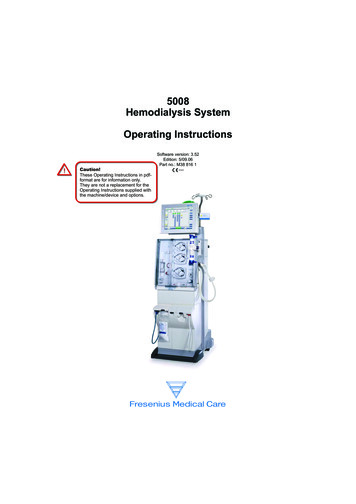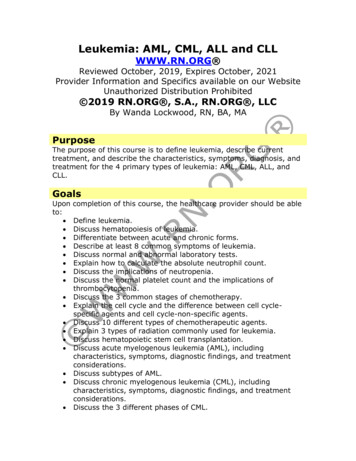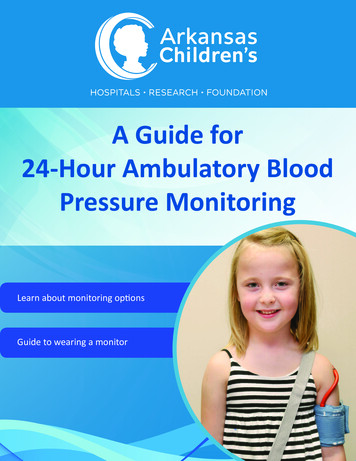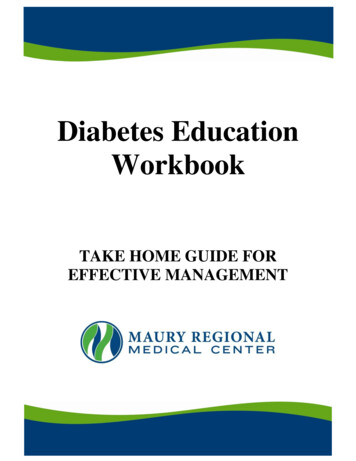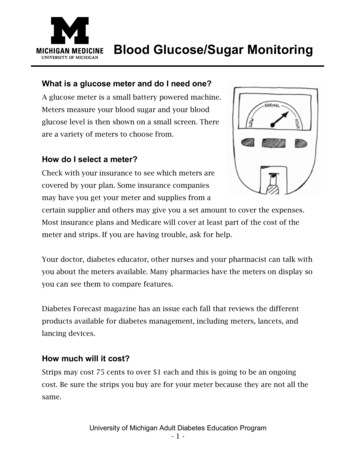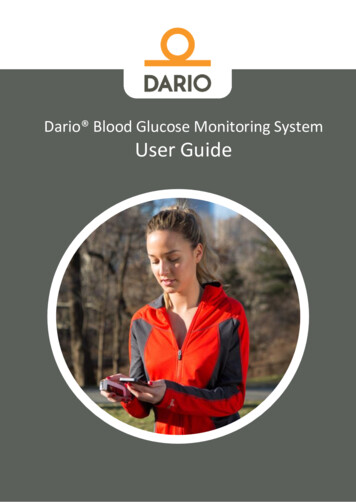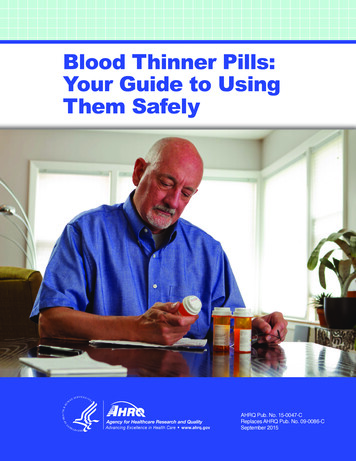
Transcription
Blood Thinner Pills:Your Guide to UsingThem SafelyAHRQ Pub. No. 15-0047-CReplaces AHRQ Pub. No. 09-0086-CSeptember 2015
The name of my blood thinner is:Reminders:Call your doctor or pharmacy if you have questions about yourblood thinner.My doctor’s contact information is:My pharmacist’s contact information is:Notes:
About Your BloodThinnerYour doctor has prescribed a medicinecalled a blood thinner to prevent bloodclots. Blood clots can put you at riskfor heart attack, stroke, and otherserious medical problems. A bloodthinner is a kind of drug called ananticoagulant (an-te-ko-AG-u-lent).“Anti” means against and “coagulant”means to thicken into a gel or solid.Blood thinner drugs work well whenthey are used correctly. To help you learn about your medicine, your doctorhas given you this booklet to read.Depending on where you receive care, you may be seen by a doctor, nurse,physician’s assistant, nurse practitioner, pharmacist, or other health careprofessional. The term “doctor” is used in this booklet to refer to the personwho helps you manage your blood thinner medicine.You and your doctor will work together as a team to make sure that takingyour blood thinner does not stop you from living well and safely. Theinformation in this booklet will help you understand why you are taking ablood thinner and how to keep yourself healthy. Please take time to read all ofthe information in this booklet.There are different types of blood thinners. The most common blood thinnerthat doctors prescribe is warfarin (Coumadin , COU-mad-din). Your doctormay also discuss usingone of the newer bloodWarning!thinners depending onyour individual situation.Tell your doctor if you are pregnantor plan to get pregnant. Many bloodthinners can cause birth defects orbleeding that may harm your unbornchild.1
How to Take Your Blood ThinnerAlways take your blood thinner as directed. For example, some bloodthinners need to be taken at the same time of day, every day.Never skip a dose, and never take a double dose.2If you miss a dose, take it as soon as you remember. If you don’t rememberuntil the next day, call your doctor for instructions. If this happens when yourdoctor is not available, skip the missed dose and start again the next day.Mark the missed dose in a diary or on a calendar.A pillbox with a slot for each day may help you keep track of your medicines.Check Your MedicineCheck your medicine when you get it from thepharmacy. Does the medicine seem different fromwhat your doctor prescribed or lookdifferent from what you expected? Does your pill look different from whatyou used before? Are the color, shape, and markings onthe pill the same as what you were givenbefore?If something seems different, ask the pharmacistto double check it. Many medication errors arefound by patients.
Using Other MedicinesTell your doctor about every medicine youtake. The doctor needs to know about allyour medicines, including medicines youused before you started taking a bloodthinner.Other medicines can change the way yourblood thinner works. Your blood thinner canalso change how other medicines work.It is very important to talk with your doctorabout all the medicines you take, including other prescription medicines,over-the-counter medicines, vitamins, and herbal products.Products that contain aspirin may lessen the blood’s ability to form clots andmay increase your risk of bleeding when you also are taking a blood thinner.If you are taking a blood thinner, talk to your doctor before taking anymedication that has aspirin in it.Medicines you get over the counter may also interact with your blood thinner.Following is a list of some common medicines that you should talk with yourdoctor or pharmacist about before using.Pain relievers, cold medicines, or stomach remedies, such as: Advil Aleve Alka-Seltzer Excedrin ex-lax Midol Motrin Nuprin Pamprin HB Vitamins and herbal products, such as: Centrum , One a Day ,or other multivitamins Garlic Pepto Bismol Sine-Off Tagamet HB Tylenol Ginkgo biloba Green teaTalk to your doctor about every medication and over-the-counterproduct that you take.3
Talk to Your OtherDoctorsBecause you take a blood thinner, youwill be seen regularly by the doctor whoprescribed the medicine. You may also seeother doctors for different problems. Whenyou see other doctors, it is very importantthat you tell them you are taking a bloodthinner. You should also tell your dentistand the person who cleans your teeth.If you use different pharmacies, make sure each pharmacist knows that youtake a blood thinner.Blood thinners can interact with medicines and treatments that other doctorsmight prescribe for you. If another doctor orders a new medicine for you, tellthe doctor who ordered your blood thinner because dose changes for yourblood thinner may be needed.4Tell all your doctors about every medication and over-the-counterproduct that you take.Tell your doctor about all your medicines.Always tell your doctor about all the medicines you are taking.Tell your doctor when you start taking new medicine, whenyou stop taking a medicine, and if the amount of medicine youare taking changes. When you visit your doctor, bring a list ofcurrent medicines, over-the-counter drugs—such as aspirin—and any vitamins and herbal products you take. A personal,medication wallet card can help you keep track of this list. Goto www.ahrq.gov/yourmedicine to download a printablewallet card that you can use to record the medicine and otherproducts that you take.
Possible Side EffectsWhen taking a blood thinner it is important to be aware of its possible sideeffects. Bleeding is the most common side effect.Call your doctor immediately if you have any of the following signs ofserious bleeding: Menstrual bleeding that is much heavier than normal. Red or brown urine. Bowel movements that are red or look like tar. Bleeding from the gums or nose that does not stop quickly. Vomit that is brown or bright red. Anything red in color that you cough up. Severe pain, such as a headache or stomachache. Unusual bruising. A cut that does not stop bleeding. A serious fall or bump on the head. Dizziness or weakness.5
Stay Safe While TakingYour Blood ThinnerCall your doctor and go to thehospital immediately if you have hada fall or hit your head, even if youare not bleeding. You can be bleedingbut not see any blood. For example, ifyou fall and hit your head, bleeding canoccur inside your skull. Or, if you hurtyour arm during a fall and then notice alarge purple bruise, this means you arebleeding under your skin.Because you are taking a blood thinner,you should try not to hurt yourself andcause bleeding. You need to be carefulwhen you use knives, scissors, razors,or any sharp object that can make youbleed.6You also need to avoid activities and sports that could cause injury.Swimming and walking are safe activities. If you would like to start a newactivity that will increase the amount of exercise you get every day, talk toyour doctor.You can still do many things that youenjoy. If you like to work in the yard,you still can. Just be sure to wearsturdy shoes and gloves to protectyourself. If you like to ride yourbike, be sure you wear a helmet.Tell others.Keep a current list of all the medicinesyou take. Ask your doctor aboutwhether you should wear a medicalalert bracelet or necklace. If you arebadly injured and unable to speak, thebracelet lets health care workers knowthat you are taking a blood thinner.
To prevent injury indoors: Be very careful using knives and scissors. Use an electric razor. Use a soft toothbrush. Use waxed dental floss. Do not use toothpicks. Wear shoes or non-skid slippers in the house. Be careful when you trim your toenails. Do not trim corns or calluses yourself.To prevent injury outdoors: Always wear shoes. Wear gloves when using sharp tools. Avoid activities and sports that can easily hurt you. Wear gardening gloves when doing yard work.7
Food and Your Blood ThinnerIf your doctor has prescribed warfarin, the foods you eat can affect how wellyour blood thinner works for you. High amounts of vitamin K can workagainst warfarin. Other blood thinners are not affected by vitamin K. Askyour doctor if your diet can affect how well your blood thinner works.8For a list of foods that contain vitamin K, go to www.usda.gov and search forvitamin K.If you are taking a blood thinner, you should avoid drinking alcohol.Call your doctor if you are unableto eat for several days, for whateverreason. Also call if you havestomach problems, vomiting, ordiarrhea that lasts more than 1 day.These problems could affect yourblood thinner dose.Keep your diet the same.Do not make any major changes in yourdiet or start a weight loss plan unlessyou talk to your doctor first.
Blood TestsYou will have to have your blood testedoften if you are taking warfarin. The bloodtest helps your doctor decide how muchmedicine you need.The International Normalized Ratio (INR)blood test measures how fast your bloodclots and lets the doctor know if your doseneeds to be changed. Testing your bloodhelps your doctor keep you in a safe range.If there is too much blood thinner in yourbody, you could bleed too much.If there is not enough, you could get a blood clot.Regular blood tests are not needed for some of the newer blood thinners.Too LittleBest RangeMay cause a blood clotToo MuchMay cause bleedingImportant reminders: Take your blood thinner as directed by your doctor. Go for blood tests as directed. Never skip a dose. Never take a double dose.9
This booklet is based on a product developed by Carla Huber, A.R.N.P., M.S.,Cedar Rapids Community Anticoagulation Clinic, Cedar Rapids, Iowa, underAHRQ Grant No. 1 U18 HSO15830-01 to Kirkwood Community College.This document is in the public domain and may be used and reprinted withoutspecial permission. Citation of the source is appreciated.How to Order AHRQ BookletsFor more copies of this booklet, email the AHRQ PublicationsClearinghouse at AHRQPubs@ahrq.hhs.gov or call the toll-freenumber 1-800-358-9295.This booklet and a video on blood thinner pills are available atwww.ahrq.gov/btpills.htm. For other consumer and patientmaterials, go to the AHRQ Web site at www.ahrq.gov/consumer.10
information in this booklet will help you understand why you are taking a blood thinner and how to keep yourself healthy. Please take time to read all of the information in this booklet. There are different types of blood thinners. The most common blood thinner that doctors pr
